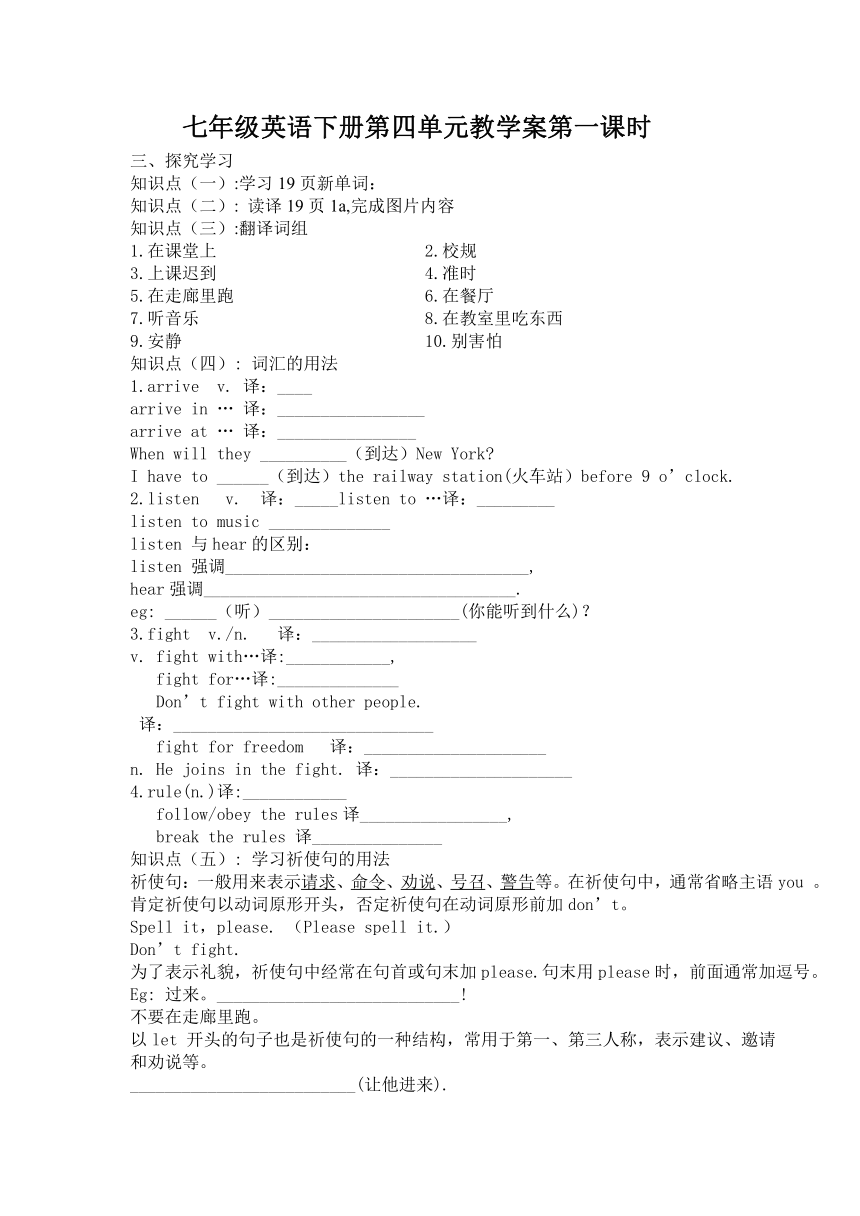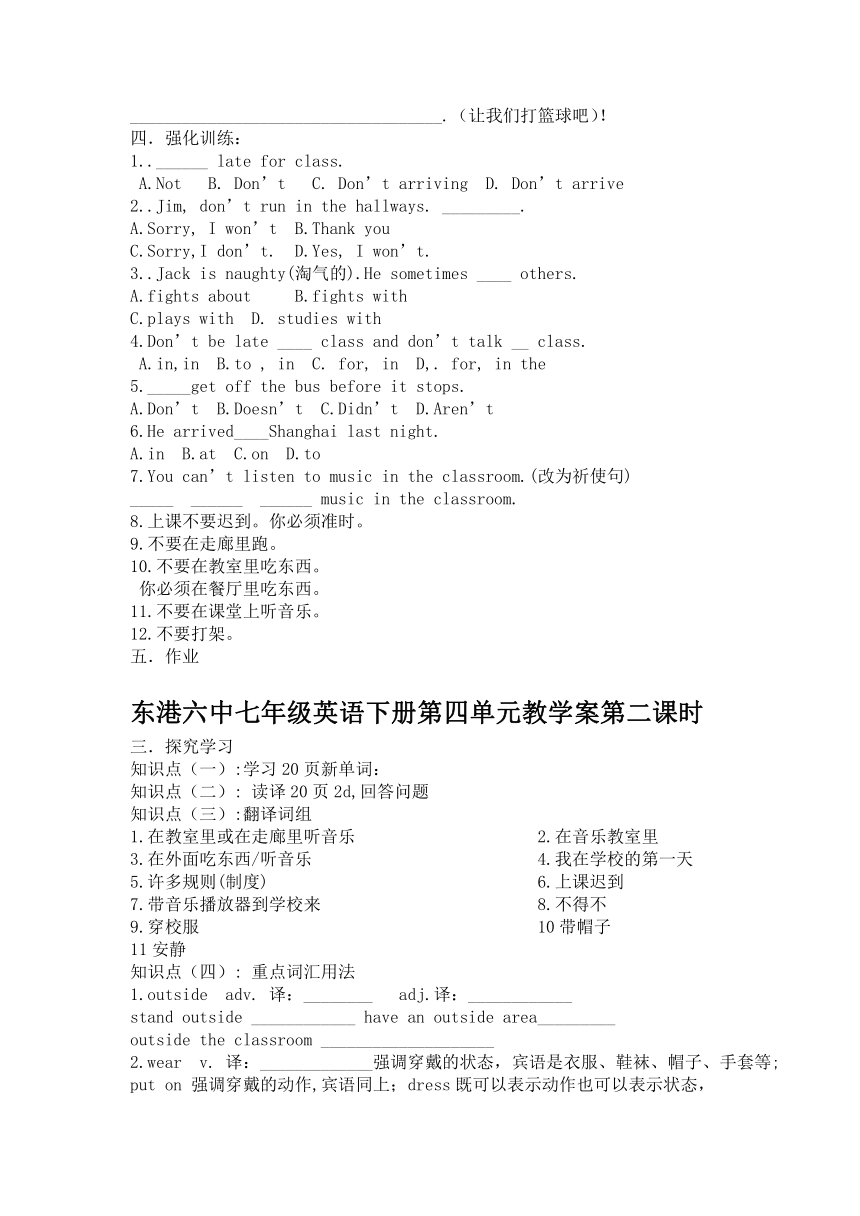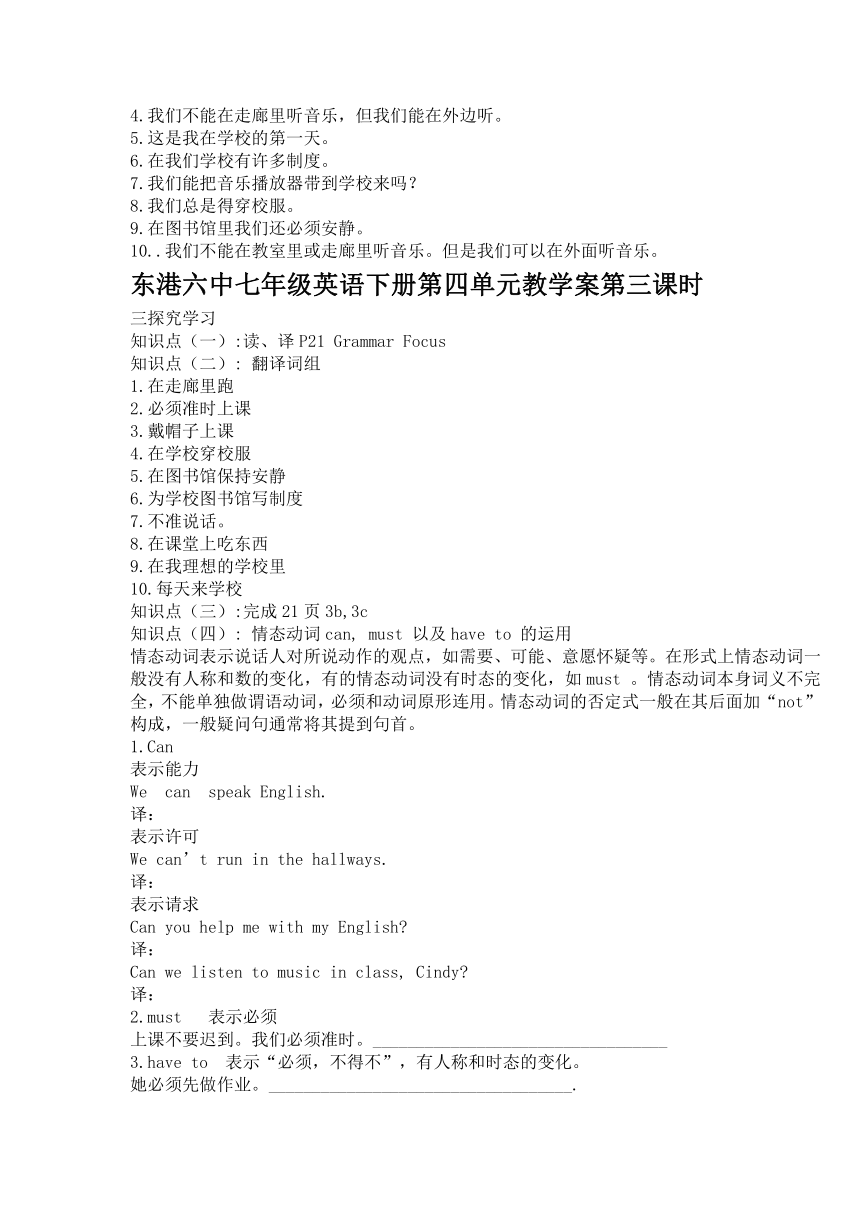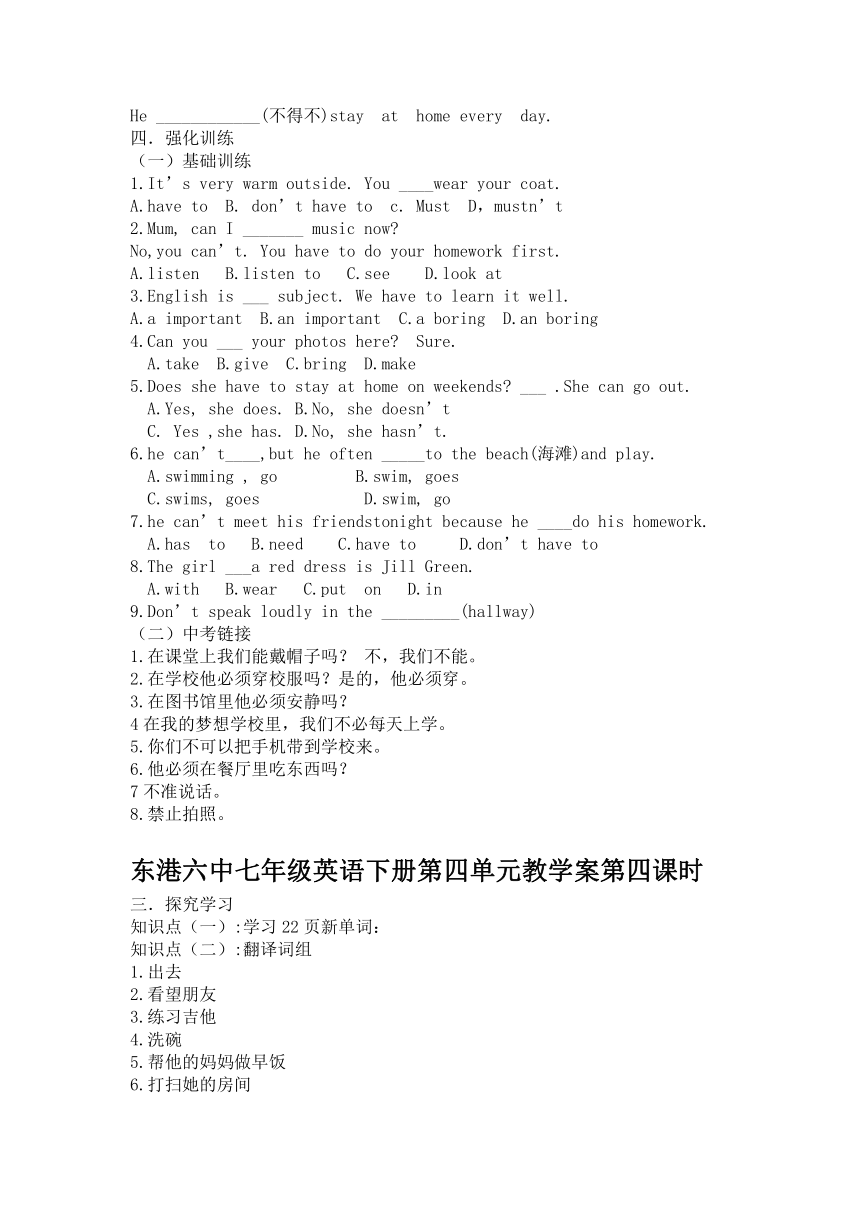人教版七年级下册Unit 4 Don't eat in class.教学案 (无答案)
文档属性
| 名称 | 人教版七年级下册Unit 4 Don't eat in class.教学案 (无答案) |  | |
| 格式 | docx | ||
| 文件大小 | 30.2KB | ||
| 资源类型 | 教案 | ||
| 版本资源 | 人教新目标(Go for it)版 | ||
| 科目 | 英语 | ||
| 更新时间 | 2024-01-15 15:00:11 | ||
图片预览





文档简介
七年级英语下册第四单元教学案第一课时
三、探究学习
知识点(一):学习19页新单词:
知识点(二): 读译19页1a,完成图片内容
知识点(三):翻译词组
1.在课堂上 2.校规
3.上课迟到 4.准时
5.在走廊里跑 6.在餐厅
7.听音乐 8.在教室里吃东西
9.安静 10.别害怕
知识点(四): 词汇的用法
1.arrive v. 译:____
arrive in … 译:_________________
arrive at … 译:________________
When will they __________(到达)New York
I have to ______(到达)the railway station(火车站)before 9 o’clock.
2.listen v. 译:_____listen to …译:_________
listen to music ______________
listen 与hear的区别:
listen 强调___________________________________,
hear强调____________________________________.
eg: ______(听)______________________(你能听到什么)?
3.fight v./n. 译:___________________
v. fight with…译:____________,
fight for…译:______________
Don’t fight with other people.
译:______________________________
fight for freedom 译:_____________________
n. He joins in the fight. 译:_____________________
4.rule(n.)译:____________
follow/obey the rules译_________________,
break the rules 译_______________
知识点(五): 学习祈使句的用法
祈使句:一般用来表示请求、命令、劝说、号召、警告等。在祈使句中,通常省略主语you 。
肯定祈使句以动词原形开头,否定祈使句在动词原形前加don’t。
Spell it,please. (Please spell it.)
Don’t fight.
为了表示礼貌,祈使句中经常在句首或句末加please.句末用please时,前面通常加逗号。
Eg: 过来。____________________________!
不要在走廊里跑。
以let 开头的句子也是祈使句的一种结构,常用于第一、第三人称,表示建议、邀请
和劝说等。
__________________________(让他进来).
____________________________________.(让我们打篮球吧)!
四.强化训练:
1..______ late for class.
A.Not B. Don’t C. Don’t arriving D. Don’t arrive
2..Jim, don’t run in the hallways. _________.
A.Sorry, I won’t B.Thank you
C.Sorry,I don’t. D.Yes, I won’t.
3..Jack is naughty(淘气的).He sometimes ____ others.
A.fights about B.fights with
C.plays with D. studies with
4.Don’t be late ____ class and don’t talk __ class.
A.in,in B.to , in C. for, in D,. for, in the
5._____get off the bus before it stops.
A.Don’t B.Doesn’t C.Didn’t D.Aren’t
6.He arrived____Shanghai last night.
A.in B.at C.on D.to
7.You can’t listen to music in the classroom.(改为祈使句)
_____ ______ ______ music in the classroom.
8.上课不要迟到。你必须准时。
9.不要在走廊里跑。
10.不要在教室里吃东西。
你必须在餐厅里吃东西。
11.不要在课堂上听音乐。
12.不要打架。
五.作业
东港六中七年级英语下册第四单元教学案第二课时
三.探究学习
知识点(一):学习20页新单词:
知识点(二): 读译20页2d,回答问题
知识点(三):翻译词组
1.在教室里或在走廊里听音乐 2.在音乐教室里
3.在外面吃东西/听音乐 4.我在学校的第一天
5.许多规则(制度) 6.上课迟到
7.带音乐播放器到学校来 8.不得不
9.穿校服 10带帽子
11安静
知识点(四): 重点词汇用法
1.outside adv. 译:________ adj.译:____________
stand outside ____________ have an outside area_________
outside the classroom ____________________
2.wear v. 译:_____________强调穿戴的状态,宾语是衣服、鞋袜、帽子、手套等;
put on 强调穿戴的动作,宾语同上;dress既可以表示动作也可以表示状态,
宾语是人(自己或他人)。
wear a hat译 ________,wear glasses 译_________
She often _______ a skirt.译: _________________________
My mother sometimes __________ my little brother.
译:_______________________________________
__________ your coat, it’s cold outside.
3.important adj.译 ______ an important meeting____________
be important for sb译:_____________________反义词_________________
4.bring v.译:___________ bring sth to sb =______________________
译_____________,
bring sth to sw译_____________________
bring与take 的区别:
bring意思是_________,指由___而____
从别处将某人或某物带到说话者这里来,
常与me、us、here连用;
take意思是____________,指由___到 ___
把某人或某物从说话者身边“拿走”或“带走”
Mike , ______ some books here.
Please _____ these apples to your brother
5.quiet adj. _______ ,be quiet译_______
keep quiet ___________ quite adv. _________
一个相当安静的男孩____________________
6.have to 译:___________,
表示客观地、被迫去做某事,有时态和人称的变化,
否定形式为___________________,表示____________的意思。
一般疑问句形式:______________________
eg:You don’t have to go there with me.
译_________________________
Does he have to leave so early
译______________________________
She has to finish her work today.
译_____________________________
must译为______,但着重于说话者的主观看法,认为有义务,有必要去做事 ,没有人称和时态的变化。否定形式mustn’t译为_________________一般疑问句Must sb do…
肯定回答____________,否定回答_____________
I must go now.__________________
You mustn’t talk in class._____________
Must I do my homework now
Yes,____ _____./No._____ ____.
四.强化训练.
1..We have to ________quiet in the library.(be)
2.There________(be)many rules in my home.
3.______late.It’s your first day to work.
A.Don’t to be B.Don’t be C.Don’t D.No
4.我们不能在走廊里听音乐,但我们能在外边听。
5.这是我在学校的第一天。
6.在我们学校有许多制度。
7.我们能把音乐播放器带到学校来吗?
8.我们总是得穿校服。
9.在图书馆里我们还必须安静。
10..我们不能在教室里或走廊里听音乐。但是我们可以在外面听音乐。
东港六中七年级英语下册第四单元教学案第三课时
三探究学习
知识点(一):读、译P21 Grammar Focus
知识点(二): 翻译词组
1.在走廊里跑
2.必须准时上课
3.戴帽子上课
4.在学校穿校服
5.在图书馆保持安静
6.为学校图书馆写制度
7.不准说话。
8.在课堂上吃东西
9.在我理想的学校里
10.每天来学校
知识点(三):完成21页3b,3c
知识点(四): 情态动词can, must 以及have to 的运用
情态动词表示说话人对所说动作的观点,如需要、可能、意愿怀疑等。在形式上情态动词一般没有人称和数的变化,有的情态动词没有时态的变化,如must 。情态动词本身词义不完全,不能单独做谓语动词,必须和动词原形连用。情态动词的否定式一般在其后面加“not”构成,一般疑问句通常将其提到句首。
1.Can
表示能力
We can speak English.
译:
表示许可
We can’t run in the hallways.
译:
表示请求
Can you help me with my English
译:
Can we listen to music in class, Cindy
译:
2.must 表示必须
上课不要迟到。我们必须准时。__________________________________
3.have to 表示“必须,不得不”,有人称和时态的变化。
她必须先做作业。___________________________________.
He ____________(不得不)stay at home every day.
四.强化训练
(一)基础训练
1.It’s very warm outside. You ____wear your coat.
A.have to B. don’t have to c. Must D,mustn’t
2.Mum, can I _______ music now
No,you can’t. You have to do your homework first.
A.listen B.listen to C.see D.look at
3.English is ___ subject. We have to learn it well.
A.a important B.an important C.a boring D.an boring
4.Can you ___ your photos here Sure.
A.take B.give C.bring D.make
5.Does she have to stay at home on weekends ___ .She can go out.
A.Yes, she does. B.No, she doesn’t
C. Yes ,she has. D.No, she hasn’t.
6.he can’t____,but he often _____to the beach(海滩)and play.
A.swimming , go B.swim, goes
C.swims, goes D.swim, go
7.he can’t meet his friendstonight because he ____do his homework.
A.has to B.need C.have to D.don’t have to
8.The girl ___a red dress is Jill Green.
A.with B.wear C.put on D.in
9.Don’t speak loudly in the _________(hallway)
(二)中考链接
1.在课堂上我们能戴帽子吗? 不,我们不能。
2.在学校他必须穿校服吗?是的,他必须穿。
3.在图书馆里他必须安静吗?
4在我的梦想学校里,我们不必每天上学。
5.你们不可以把手机带到学校来。
6.他必须在餐厅里吃东西吗?
7不准说话。
8.禁止拍照。
东港六中七年级英语下册第四单元教学案第四课时
三.探究学习
知识点(一):学习22页新单词:
知识点(二):翻译词组
1.出去
2.看望朋友
3.练习吉他
4.洗碗
5.帮他的妈妈做早饭
6.打扫她的房间
7.上学日的晚上
8.在上学日
9.放学后
10.晚饭之前
11.每周六
12.晚饭后
知识点(三): 词汇的用法
1.practice v./n. 译:_____________, 做名词时,为________可数名词。
Practice doing sth. 译:__________
eg: Jim often ______________(practice) ________ (play) the guitar after school.
2.before conj./prep.译__________, adv译______________
I have to read a book before I can watch TV.
译:
My father usually goes to bed before 9p.m.
译:
I told you about the news before.
译:
3.help v./n.译__________; help sb (to)do…译_______________=help sb with sth
eg: Can you help me______(learn) English =Can you help me_______my English
help oneself to sth
译_________________________
help sb out
译______________________________
can’t help doing sth
译________________________
with the help of sb/with one’s help
知识点(四):完成22页1b,1c听力活动
四、训练提升
(一)基础训练
1.Let’s go __________ for a walk.
2.What do you usually do in the morning –I often practice__________(speak)English.
3.I don’t like to do the _________(dish) after dinner.
4.Students sing a song b________classes.
5.We can’t watch TV _______ school nights.
6.—______sing! —All right.
A.Let B.Let’s C.We let D.Let’s to
7.—Must I go to school on time —____,you______.
A.No,can’t B.No,mustn’t
C.No,don’t have to D.Not,needn’t
8.It’s very warm,you___to wear the sweater.
A.must B.don’t have C.have D.mustn’t
9.She has to help her mother do housework.
否定句_______________________________
一般疑问句_____________________________________
10.We can wear hats in school.(改为否定句)We_______ _______hats in school.
(二)中考链接
11.Stand there,please,(改为否定句)
______ ______ _______ ,please.
12在上学的晚上我不能出去。
13在上学日我不能看朋友。
14.我每天在晚饭后练习弹一小时的钢琴。
15.有时我得帮助我妈妈做早餐。
Sometimes__________________________
16.他不得不在放后做作业吗?
东港六中七年级英语下册第四单元教学案第五课时
一.导入新课
二.学习目标
1.学习23页生词;
2.读译23页2b,完成2c句子;
3.掌握23页词组;
4.掌握重点词汇用法;
三.探究学习
知识点(一):学习23页新单词:
知识点(二): 读译23页2b,完成2c句子.
知识点(三):翻译词组
1.太多的规则 2.整理床铺
3.早饭后 4.把脏餐具留在厨房里
5.跑到学校 6.有更多的规则
7.吵闹 8.看书
9.上床睡觉 10.考虑
11.制定规矩来帮助我们 12.在周末
13.到家 14.祝你好运!
15.遵守规则
知识点(四): 重点词汇用法
1.noisy adj. 译为:________, n.________译为_________, 反义词:________
2.relax v. 译:__________ adj.___________/__________
relaxing主要用来修饰_________,表示“令人放松的”,relaxed主要用来修饰________,表示某人感到轻松。
We can _________ at home on weekends.
We are ____________ on weekends.
Music is _______________.
3.feel 用作连系动词译为:_______,后接形容词作表语。 feel happy ________ feel soft ___________
4.strict adj. 译:_____________ 对某人要求严格_____________对某事要求严格______________
His father is strict ________ him ______his study.
5.remember v. 译:_________ 记得做过某事____________,记得要去做某事______________
I remember making my bed. 译:
Remember to do your homework after school. 译:
6.luck n. 译:________ adj:______ adv. ______
Good ______ to you . 译:
I’m ______ to be here. 译:
_________, I got to school on time. 译:________________________
7.leave sth. +表示地点的介词短语(in/on/at…) 译:___________
I left my bag in the taxi.译:_______________
8.more adj 译为______,是______和______的比较级,后既可接可数名词复数又可接不可数名词。
eg: Tom needs_____________.(更多的钢笔)
We need _______________(更多的时间).
9.too many译为______,修饰可数名词复数,而_______ ______修饰不可数名词,修饰形容词和副词用_______ _______
四.强化训练
(一)基础训练
1.I know ___ you feel.
A.what B.how C.why D.when
2.I can’t listen to music at home and I can’t listen to it at school,______.
A.either B.also C.too D.or
3.Don’t ____ your school things at home.
A.forget B.leave C.remember D. make
4.I can’t go to the movies with you. I have to help my mom____ dinner.
A.do B.cooking C.make D.to get
5.We have to ____ our school rules because we are students.
A.break B.make C.follow D.get
6.Don’t eat_____junk food,or you’ll be_____fat.
A.too many, too much B.too much,much too
C.too much,too many D. too many,much many
(二)中考链接
1.He often _________________(把钥匙落在家里).
2.Remember _________ (do) your homework after school .
3.Good ________ to you. (lucky)
4.Tom’s father is strict __________ him ________ his study.
5.Listening to music is _____________.(relax)
6.不要把脏盘子留在厨房里
7.在学校我们有更多的规矩
8.我爸爸说放学后我不能打篮球因为我必须做作业。
9.在我能看电视前我必须看书。
10.我理解你的感受。
五.作业
东港六中七年级英语下册第四单元教学案第六课时
三.探究学习
知识点(一):学习24页新单词:
知识点(二): 完成24页3a, Self Check 1&2.
知识点(三):翻译词组
1.六点起床
2.留短发(2)
3.和我的朋友们一起玩
4.学习弹钢琴
5.玩的愉快(3)
6.去厨房为爷爷拿食物
7.晚点到厨房
8.到那儿
9.吵闹
10.对某人要求严格
11.上课迟到(2
知识点(四): 重点词汇用法
1.keep v. 译:__________, keep+sth./sb.+adj 表示使某人/某物保持......(某种状态)
These clothes can keep you warm.
译:
You should keep your room clean.
译:
2.hair n. 头发, 常用作不可数名词,不能与不定冠词a连用,也无复数形式,但hair在表示具体数量的头发时是可数名词。
She has long hair. 译:
There are a few hairs in the book.
译:
3.learn v. 译:____________
learn sth. 学习某个内容
learn to do sth. 学习\学会做某事
He wants to learn ______________(play) the piano.
四.强化训练
(一)基础训练
1.We should _____________________(保持教室清洁).
2.He wants to learn _____________(play) tennis.
3.She has to _______________(留短发).
4.Please remember __________(wear) your uniform to school.
5.There are ____ rules in my house.
A.too many B.too much
C.much too D.many too
6.____ she ___ clean the classroom every day
A.Does, has to B. Does, have to
C. Does, has D. Does, have
7.Don’t ____ TV too much after school.
A.watching B.to watch
C.to watching D.watch
8.I can’t go out ___ school nights. But I can go out ___ weekends.
A.in,in B.on,in C.in, on D.on ,on
9.Our teacher are strict ___ us.
A.for B.about C.with D.in
(二)中考链接
1.我不高兴因为家里有太多的规矩。
2.在学校我必须穿校服,我必须留短发
3.放学后,我不能和朋友一起看电视因为我必须先做作业。
4.在周末我也不能放松因为我得学习弹钢琴。
5.我到厨房从不迟到因为我必须在猫起床以前到那儿。
6.我爷爷总是告诉我不能太吵。
三、探究学习
知识点(一):学习19页新单词:
知识点(二): 读译19页1a,完成图片内容
知识点(三):翻译词组
1.在课堂上 2.校规
3.上课迟到 4.准时
5.在走廊里跑 6.在餐厅
7.听音乐 8.在教室里吃东西
9.安静 10.别害怕
知识点(四): 词汇的用法
1.arrive v. 译:____
arrive in … 译:_________________
arrive at … 译:________________
When will they __________(到达)New York
I have to ______(到达)the railway station(火车站)before 9 o’clock.
2.listen v. 译:_____listen to …译:_________
listen to music ______________
listen 与hear的区别:
listen 强调___________________________________,
hear强调____________________________________.
eg: ______(听)______________________(你能听到什么)?
3.fight v./n. 译:___________________
v. fight with…译:____________,
fight for…译:______________
Don’t fight with other people.
译:______________________________
fight for freedom 译:_____________________
n. He joins in the fight. 译:_____________________
4.rule(n.)译:____________
follow/obey the rules译_________________,
break the rules 译_______________
知识点(五): 学习祈使句的用法
祈使句:一般用来表示请求、命令、劝说、号召、警告等。在祈使句中,通常省略主语you 。
肯定祈使句以动词原形开头,否定祈使句在动词原形前加don’t。
Spell it,please. (Please spell it.)
Don’t fight.
为了表示礼貌,祈使句中经常在句首或句末加please.句末用please时,前面通常加逗号。
Eg: 过来。____________________________!
不要在走廊里跑。
以let 开头的句子也是祈使句的一种结构,常用于第一、第三人称,表示建议、邀请
和劝说等。
__________________________(让他进来).
____________________________________.(让我们打篮球吧)!
四.强化训练:
1..______ late for class.
A.Not B. Don’t C. Don’t arriving D. Don’t arrive
2..Jim, don’t run in the hallways. _________.
A.Sorry, I won’t B.Thank you
C.Sorry,I don’t. D.Yes, I won’t.
3..Jack is naughty(淘气的).He sometimes ____ others.
A.fights about B.fights with
C.plays with D. studies with
4.Don’t be late ____ class and don’t talk __ class.
A.in,in B.to , in C. for, in D,. for, in the
5._____get off the bus before it stops.
A.Don’t B.Doesn’t C.Didn’t D.Aren’t
6.He arrived____Shanghai last night.
A.in B.at C.on D.to
7.You can’t listen to music in the classroom.(改为祈使句)
_____ ______ ______ music in the classroom.
8.上课不要迟到。你必须准时。
9.不要在走廊里跑。
10.不要在教室里吃东西。
你必须在餐厅里吃东西。
11.不要在课堂上听音乐。
12.不要打架。
五.作业
东港六中七年级英语下册第四单元教学案第二课时
三.探究学习
知识点(一):学习20页新单词:
知识点(二): 读译20页2d,回答问题
知识点(三):翻译词组
1.在教室里或在走廊里听音乐 2.在音乐教室里
3.在外面吃东西/听音乐 4.我在学校的第一天
5.许多规则(制度) 6.上课迟到
7.带音乐播放器到学校来 8.不得不
9.穿校服 10带帽子
11安静
知识点(四): 重点词汇用法
1.outside adv. 译:________ adj.译:____________
stand outside ____________ have an outside area_________
outside the classroom ____________________
2.wear v. 译:_____________强调穿戴的状态,宾语是衣服、鞋袜、帽子、手套等;
put on 强调穿戴的动作,宾语同上;dress既可以表示动作也可以表示状态,
宾语是人(自己或他人)。
wear a hat译 ________,wear glasses 译_________
She often _______ a skirt.译: _________________________
My mother sometimes __________ my little brother.
译:_______________________________________
__________ your coat, it’s cold outside.
3.important adj.译 ______ an important meeting____________
be important for sb译:_____________________反义词_________________
4.bring v.译:___________ bring sth to sb =______________________
译_____________,
bring sth to sw译_____________________
bring与take 的区别:
bring意思是_________,指由___而____
从别处将某人或某物带到说话者这里来,
常与me、us、here连用;
take意思是____________,指由___到 ___
把某人或某物从说话者身边“拿走”或“带走”
Mike , ______ some books here.
Please _____ these apples to your brother
5.quiet adj. _______ ,be quiet译_______
keep quiet ___________ quite adv. _________
一个相当安静的男孩____________________
6.have to 译:___________,
表示客观地、被迫去做某事,有时态和人称的变化,
否定形式为___________________,表示____________的意思。
一般疑问句形式:______________________
eg:You don’t have to go there with me.
译_________________________
Does he have to leave so early
译______________________________
She has to finish her work today.
译_____________________________
must译为______,但着重于说话者的主观看法,认为有义务,有必要去做事 ,没有人称和时态的变化。否定形式mustn’t译为_________________一般疑问句Must sb do…
肯定回答____________,否定回答_____________
I must go now.__________________
You mustn’t talk in class._____________
Must I do my homework now
Yes,____ _____./No._____ ____.
四.强化训练.
1..We have to ________quiet in the library.(be)
2.There________(be)many rules in my home.
3.______late.It’s your first day to work.
A.Don’t to be B.Don’t be C.Don’t D.No
4.我们不能在走廊里听音乐,但我们能在外边听。
5.这是我在学校的第一天。
6.在我们学校有许多制度。
7.我们能把音乐播放器带到学校来吗?
8.我们总是得穿校服。
9.在图书馆里我们还必须安静。
10..我们不能在教室里或走廊里听音乐。但是我们可以在外面听音乐。
东港六中七年级英语下册第四单元教学案第三课时
三探究学习
知识点(一):读、译P21 Grammar Focus
知识点(二): 翻译词组
1.在走廊里跑
2.必须准时上课
3.戴帽子上课
4.在学校穿校服
5.在图书馆保持安静
6.为学校图书馆写制度
7.不准说话。
8.在课堂上吃东西
9.在我理想的学校里
10.每天来学校
知识点(三):完成21页3b,3c
知识点(四): 情态动词can, must 以及have to 的运用
情态动词表示说话人对所说动作的观点,如需要、可能、意愿怀疑等。在形式上情态动词一般没有人称和数的变化,有的情态动词没有时态的变化,如must 。情态动词本身词义不完全,不能单独做谓语动词,必须和动词原形连用。情态动词的否定式一般在其后面加“not”构成,一般疑问句通常将其提到句首。
1.Can
表示能力
We can speak English.
译:
表示许可
We can’t run in the hallways.
译:
表示请求
Can you help me with my English
译:
Can we listen to music in class, Cindy
译:
2.must 表示必须
上课不要迟到。我们必须准时。__________________________________
3.have to 表示“必须,不得不”,有人称和时态的变化。
她必须先做作业。___________________________________.
He ____________(不得不)stay at home every day.
四.强化训练
(一)基础训练
1.It’s very warm outside. You ____wear your coat.
A.have to B. don’t have to c. Must D,mustn’t
2.Mum, can I _______ music now
No,you can’t. You have to do your homework first.
A.listen B.listen to C.see D.look at
3.English is ___ subject. We have to learn it well.
A.a important B.an important C.a boring D.an boring
4.Can you ___ your photos here Sure.
A.take B.give C.bring D.make
5.Does she have to stay at home on weekends ___ .She can go out.
A.Yes, she does. B.No, she doesn’t
C. Yes ,she has. D.No, she hasn’t.
6.he can’t____,but he often _____to the beach(海滩)and play.
A.swimming , go B.swim, goes
C.swims, goes D.swim, go
7.he can’t meet his friendstonight because he ____do his homework.
A.has to B.need C.have to D.don’t have to
8.The girl ___a red dress is Jill Green.
A.with B.wear C.put on D.in
9.Don’t speak loudly in the _________(hallway)
(二)中考链接
1.在课堂上我们能戴帽子吗? 不,我们不能。
2.在学校他必须穿校服吗?是的,他必须穿。
3.在图书馆里他必须安静吗?
4在我的梦想学校里,我们不必每天上学。
5.你们不可以把手机带到学校来。
6.他必须在餐厅里吃东西吗?
7不准说话。
8.禁止拍照。
东港六中七年级英语下册第四单元教学案第四课时
三.探究学习
知识点(一):学习22页新单词:
知识点(二):翻译词组
1.出去
2.看望朋友
3.练习吉他
4.洗碗
5.帮他的妈妈做早饭
6.打扫她的房间
7.上学日的晚上
8.在上学日
9.放学后
10.晚饭之前
11.每周六
12.晚饭后
知识点(三): 词汇的用法
1.practice v./n. 译:_____________, 做名词时,为________可数名词。
Practice doing sth. 译:__________
eg: Jim often ______________(practice) ________ (play) the guitar after school.
2.before conj./prep.译__________, adv译______________
I have to read a book before I can watch TV.
译:
My father usually goes to bed before 9p.m.
译:
I told you about the news before.
译:
3.help v./n.译__________; help sb (to)do…译_______________=help sb with sth
eg: Can you help me______(learn) English =Can you help me_______my English
help oneself to sth
译_________________________
help sb out
译______________________________
can’t help doing sth
译________________________
with the help of sb/with one’s help
知识点(四):完成22页1b,1c听力活动
四、训练提升
(一)基础训练
1.Let’s go __________ for a walk.
2.What do you usually do in the morning –I often practice__________(speak)English.
3.I don’t like to do the _________(dish) after dinner.
4.Students sing a song b________classes.
5.We can’t watch TV _______ school nights.
6.—______sing! —All right.
A.Let B.Let’s C.We let D.Let’s to
7.—Must I go to school on time —____,you______.
A.No,can’t B.No,mustn’t
C.No,don’t have to D.Not,needn’t
8.It’s very warm,you___to wear the sweater.
A.must B.don’t have C.have D.mustn’t
9.She has to help her mother do housework.
否定句_______________________________
一般疑问句_____________________________________
10.We can wear hats in school.(改为否定句)We_______ _______hats in school.
(二)中考链接
11.Stand there,please,(改为否定句)
______ ______ _______ ,please.
12在上学的晚上我不能出去。
13在上学日我不能看朋友。
14.我每天在晚饭后练习弹一小时的钢琴。
15.有时我得帮助我妈妈做早餐。
Sometimes__________________________
16.他不得不在放后做作业吗?
东港六中七年级英语下册第四单元教学案第五课时
一.导入新课
二.学习目标
1.学习23页生词;
2.读译23页2b,完成2c句子;
3.掌握23页词组;
4.掌握重点词汇用法;
三.探究学习
知识点(一):学习23页新单词:
知识点(二): 读译23页2b,完成2c句子.
知识点(三):翻译词组
1.太多的规则 2.整理床铺
3.早饭后 4.把脏餐具留在厨房里
5.跑到学校 6.有更多的规则
7.吵闹 8.看书
9.上床睡觉 10.考虑
11.制定规矩来帮助我们 12.在周末
13.到家 14.祝你好运!
15.遵守规则
知识点(四): 重点词汇用法
1.noisy adj. 译为:________, n.________译为_________, 反义词:________
2.relax v. 译:__________ adj.___________/__________
relaxing主要用来修饰_________,表示“令人放松的”,relaxed主要用来修饰________,表示某人感到轻松。
We can _________ at home on weekends.
We are ____________ on weekends.
Music is _______________.
3.feel 用作连系动词译为:_______,后接形容词作表语。 feel happy ________ feel soft ___________
4.strict adj. 译:_____________ 对某人要求严格_____________对某事要求严格______________
His father is strict ________ him ______his study.
5.remember v. 译:_________ 记得做过某事____________,记得要去做某事______________
I remember making my bed. 译:
Remember to do your homework after school. 译:
6.luck n. 译:________ adj:______ adv. ______
Good ______ to you . 译:
I’m ______ to be here. 译:
_________, I got to school on time. 译:________________________
7.leave sth. +表示地点的介词短语(in/on/at…) 译:___________
I left my bag in the taxi.译:_______________
8.more adj 译为______,是______和______的比较级,后既可接可数名词复数又可接不可数名词。
eg: Tom needs_____________.(更多的钢笔)
We need _______________(更多的时间).
9.too many译为______,修饰可数名词复数,而_______ ______修饰不可数名词,修饰形容词和副词用_______ _______
四.强化训练
(一)基础训练
1.I know ___ you feel.
A.what B.how C.why D.when
2.I can’t listen to music at home and I can’t listen to it at school,______.
A.either B.also C.too D.or
3.Don’t ____ your school things at home.
A.forget B.leave C.remember D. make
4.I can’t go to the movies with you. I have to help my mom____ dinner.
A.do B.cooking C.make D.to get
5.We have to ____ our school rules because we are students.
A.break B.make C.follow D.get
6.Don’t eat_____junk food,or you’ll be_____fat.
A.too many, too much B.too much,much too
C.too much,too many D. too many,much many
(二)中考链接
1.He often _________________(把钥匙落在家里).
2.Remember _________ (do) your homework after school .
3.Good ________ to you. (lucky)
4.Tom’s father is strict __________ him ________ his study.
5.Listening to music is _____________.(relax)
6.不要把脏盘子留在厨房里
7.在学校我们有更多的规矩
8.我爸爸说放学后我不能打篮球因为我必须做作业。
9.在我能看电视前我必须看书。
10.我理解你的感受。
五.作业
东港六中七年级英语下册第四单元教学案第六课时
三.探究学习
知识点(一):学习24页新单词:
知识点(二): 完成24页3a, Self Check 1&2.
知识点(三):翻译词组
1.六点起床
2.留短发(2)
3.和我的朋友们一起玩
4.学习弹钢琴
5.玩的愉快(3)
6.去厨房为爷爷拿食物
7.晚点到厨房
8.到那儿
9.吵闹
10.对某人要求严格
11.上课迟到(2
知识点(四): 重点词汇用法
1.keep v. 译:__________, keep+sth./sb.+adj 表示使某人/某物保持......(某种状态)
These clothes can keep you warm.
译:
You should keep your room clean.
译:
2.hair n. 头发, 常用作不可数名词,不能与不定冠词a连用,也无复数形式,但hair在表示具体数量的头发时是可数名词。
She has long hair. 译:
There are a few hairs in the book.
译:
3.learn v. 译:____________
learn sth. 学习某个内容
learn to do sth. 学习\学会做某事
He wants to learn ______________(play) the piano.
四.强化训练
(一)基础训练
1.We should _____________________(保持教室清洁).
2.He wants to learn _____________(play) tennis.
3.She has to _______________(留短发).
4.Please remember __________(wear) your uniform to school.
5.There are ____ rules in my house.
A.too many B.too much
C.much too D.many too
6.____ she ___ clean the classroom every day
A.Does, has to B. Does, have to
C. Does, has D. Does, have
7.Don’t ____ TV too much after school.
A.watching B.to watch
C.to watching D.watch
8.I can’t go out ___ school nights. But I can go out ___ weekends.
A.in,in B.on,in C.in, on D.on ,on
9.Our teacher are strict ___ us.
A.for B.about C.with D.in
(二)中考链接
1.我不高兴因为家里有太多的规矩。
2.在学校我必须穿校服,我必须留短发
3.放学后,我不能和朋友一起看电视因为我必须先做作业。
4.在周末我也不能放松因为我得学习弹钢琴。
5.我到厨房从不迟到因为我必须在猫起床以前到那儿。
6.我爷爷总是告诉我不能太吵。
同课章节目录
- Unit 1 Can you play the guitar?
- Section A
- Section B
- Unit 2 What time do you go to school?
- Section A
- Section B
- Unit 3 How do you get to school?
- Section A
- Section B
- Unit 4 Don't eat in class.
- Section A
- Section B
- Unit 5 Why do you like pandas?
- Section A
- Section B
- Unit 6 I'm watching TV.
- Section A
- Section B
- Review of Units 1-6
- Unit 7 It's raining!
- Section A
- Section B
- Unit 8 Is there a post office near here?
- Section A
- Section B
- Unit 9 What does he look like?
- Section A
- Section B
- Unit 10 I'd like some noodles.
- Section A
- Section B
- Unit 11 How was your school trip?
- Section A
- Section B
- Unit 12 What did you do last weekend?
- Section A
- Section B
